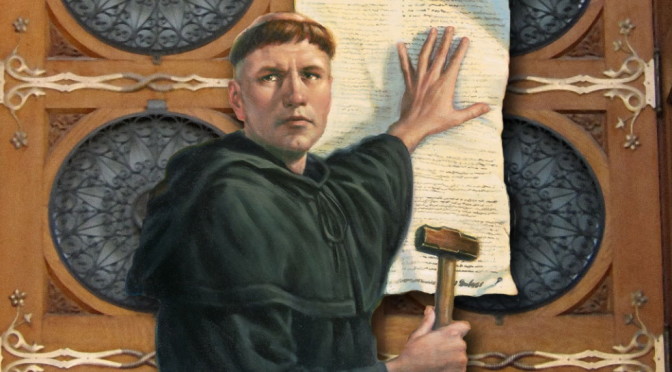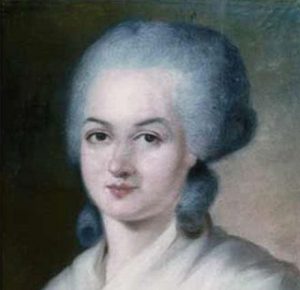In 1517 Martin Luther was provoked by Johann Tetzel to write his famous 95 Theses. In the spring of 1517, Johann Tetzel, a German friar who practiced the selling of indulgences in Germany, was preaching on indulgences in the city of Jüterbog. By selling indulgences, Tetzel and the Catholic Church gained monetary value in exchange for a believer’s future diminished time in purgatory. In other words, one’s sins would be forgiven if one were to buy these indulgences. Luther, who was a Theology professor at the University of Wittenberg, attended to Tetzel’s preaching. Luther felt disgusted by the act, and as a Theology professor he felt that he had to address this issue in a scholarly way. During the summer of 1517 Luther started to write the 95 Theses, which was not only a criticism of the selling of indulgences, but also a criticism of many of the actions and practices of the Catholic Church, particularly of its hierarchy. 1

The 95 Theses consisted of Luther challenging the teachings of the Catholic Church on the nature of penance, the authority of the pope, and the selling of indulgences. He believed that the salvation of a person’s soul should not be based on one’s monetary contribution to the church. Luther believed that faith was the only way to reach salvation and not the monetary contributions to the church. Quoting Saint Paul, Luther wrote, “The just will live by faith.”2 In the 95 Theses Luther not only criticized the Catholic Church and its corruption, but also set numerous propositions for reforming the Catholic Church. After writing the 95 Theses, on October 31, 1517, Luther decided to nail them to the door of the Wittenberg Church. After this event, the 95 Theses started to be spread throughout Europe. A year after Luther wrote the 95 Theses, they were condemned as heretical by Pope Leo X, and Luther was also excommunicated from the Catholic Church that same year.3
Martin Luther was given the chance to recant his statements against the Catholic Church at the Imperial Diet of Worms in 1521, but he refused. Luther famously said:
Unless I am convinced by the testimony of the Holy Scriptures or by evident reason—for I can believe neither pope nor councils alone, as it is clear that they have erred repeatedly and contradicted themselves—I consider myself convicted by the testimony of Holy Scripture, which is my basis; my conscience is captive to the Word of God. Thus I cannot and will not recant, because acting against one’s conscience is neither safe nor sound. God help me. Amen.4
Luther believed that salvation was reached by faith alone, and not by the works of giving money to the church, and he held to these beliefs for the rest of his life. Luther was also responsible for starting the Protestant Reformation, where a large number of Catholics decided to follow his steps by separating from the Catholic Church. Luther not only started the Protestant Reformation, but he also contributed to the so-called Catholic Reformation of the Catholic Church as well, since his 95 Theses sparked a reform movement within the Catholic Church that culminated in the Council of Trent. Even though Luther was seen as a controversial person in the Catholic Church, he contributed in significant ways to what the Catholic Church is today.5
- Encyclopedia Britannica, s.v. “Johann Tetzel.” ↵
- Romans 1:17. ↵
- Andrew Culp and Kevin Kuswa, “Signs of protest rhetoric: From Logos to logistics in Luther’s Ninety-Five Theses,” Quarterly Journal Of Speech 102, no. 2 (May 2016): 153-154. ↵
- Heiko Oberman, Luther: Man Between God and the Devil (New York: Image Books – Doubleday Press, 1992), 39. ↵
- Scott H. Hendrix, Martin Luther: Visionary Reformer (New Haven: Yale University Press, 2015), 145-150. ↵



52 comments
Mario Sosa
It is unbelievable how one priest was responsible for starting the Protestant Reformation which would eventually cause the Thirty Years’ War, as well as many other conflicts. All it took was for one guy to nail a list of things that was wrong with the Catholic Church. For something that caused so much controversy, it is amazing that Martin Luther wasn’t imprisoned or executed. An excellent article, nicely done.
Mariana Govea
I love this article! Great topic to write about! I love Martin Luther and his motivation into carrying out with the 95 Theses!! Before reading this article I had a knowledge of he was since back in High School we did talk about him as well as in the first chapter of the reading you assigned us, it goes deeper into what he did and how he did it! I love him and what he did for our Roman Church since, he believed that the pardon of God was not given to you by the donation of money you gave, but for you being at a good state with God, and that nobody could give your forgiveness but God himself! Which I think he did more than great by staying determined to carry out his 95 Theses to stop the church from taking money from people,when they never really needed to give money, when they could still be forgiven for their sins regardless if they had money or not!! Great read!
Luke Trevino
Great! I strongly believed Martin Luthers work changed the course of history for the church. He opened the eyes of many clergy that with faith is how salvation is achieved. If he were to have not done what he did the church would be making a lot of money off of a lie they created in the act of indulgences. Martin Luther still to this day is a great example of not giving up on ones belief.
Rafael Ortiz Salas
I didn’t know who Martin Luther was before reading your article. Its interesting that in the past you couldn’t speak up against the church, I always believed you could. I knew the Catholic Church had major power in the past, and I’m glad people stood up to try to change it for the better. Very cool article. 🙂
Tina Valdez
I’ve always credited this event to the spark of Protestant Reformation. This information is extremely relevant to both Protestant and Catholic faiths so I love that you chose a subject that would be relevant to so many people. Your article really puts things in perspective in regards to how much of an impact Luther had. It is interesting that it took a year for the Pope to deem the theses heretical, it makes me wonder what occurred between the posting of the theses and them being condemned. Great article!
Maranda Avina
In my previous class I had actually learned about Martin Luther so it was interesting to hear about him again in more detail. His contribution to the Protestant reformation and the catholic church is truly amazing and has greatly impacted religion. Great article and a good job!
Jezel Luna
Prior to reading about Martin Luther, I was not aware about the 95 Theses. It was interesting to see the role he played in challenging the teachings of the Catholic Church. I found it enlightening how explicit he was when explaining the exploitation of the Catholic Church. Very well researched and detailed.
Mariana Sandoval
It’s interesting to hear that Martin Luther not only sparked the Protestant Reformation, but that he also sparked a change in the Catholic Church. When we think if Martin Luther, I solely think of the Protestant Reformation and I never thought to think that the Catholic Church might have also reformed itself after this event. I think I will look further into the exact changes that happened in the Catholic Church as a result of his theses. Nice sources!
Rachel White
Before reading this, I had a basic idea of what the 95 Theses was based on, and how strange the concept of paying for your sins was. This article gave me more appreciation for Martin Luther and his role in calling out the church for doing this and for being a key starter of the Catholic Reformation, which I was not aware of prior. Great article and good sources.
Celina Resendez
I’ve always thought it was so strange that indulgences were sold for salvation. Perhaps if we lived at that time, we would not see this as an issue. It took a lot for Luther to stand up for what he believed in and push back against this practice. Great article!